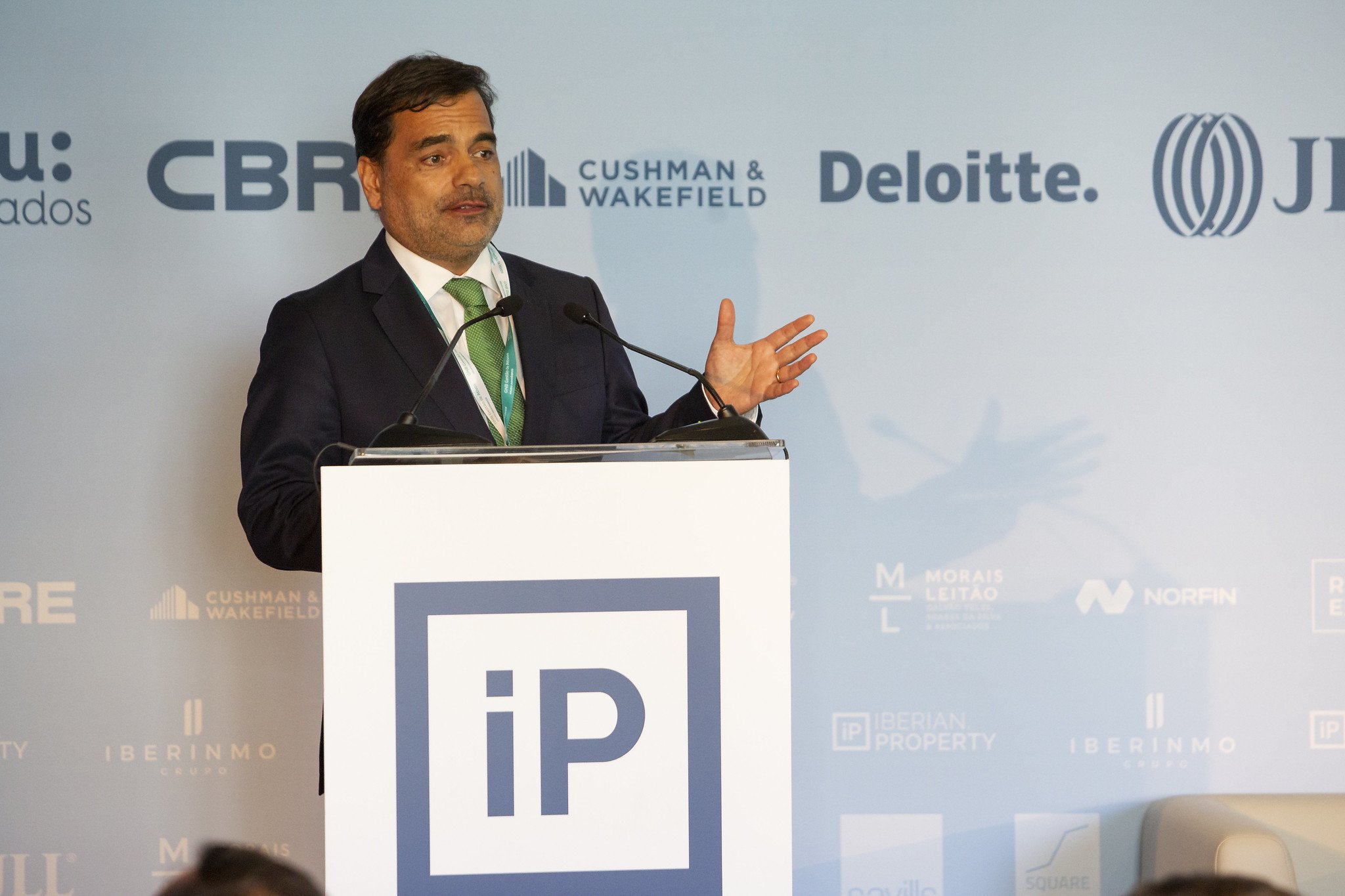PORTUGAL IS IN ITS COMPETITIVENESS PEAK, BUT ITS TIME TO LAY SUSTAINABLE FOUNDATIONS
Portugal Real Estate Summit - 2024
On the 23rd and 24th of September, Iberian Property brought to Estoril the 8th edition of the Portugal Real Estate Summit, where the global property sector was well represented by almost 500 industry leaders from over 20 countries, making this the most attended edition ever.
With a fresh economic perspective, the Portugal Real Estate Summit kicked-off by the hand of Carlos Costa, former Governor of the Portuguese Central Bank, the importance of the property sector in building a sustainable economic future for Portugal.
During an interview conducted by Gilberto Jordan, Chairman of the Editorial Council of Iberian Property, the former governor of the ‘Banco de Portugal’ analysed the course of the Portuguese economy since the 2011 crisis, praising the work done. “The recovery has been remarkable, especially considering the difficulty of those times. However, it is essential to recognise that, despite the progress made, the current situation still leaves room for improvements”, he remarked.
Access all the presentations of the Portugal Real Estate Summit 2024:
JLL + Savills | CBRE + C&W | Deloitte | CML - Filipa Roseta | CMP - Pedro Baganha
Real estate is crucial to forming the foundations of sustainable economic development
“We have to talk about the property sector if we want to lay the foundations for sustainable economic development,” Carlos Costa began. The former governor emphasised that housing, mobility, education, health and interpersonal relationships constitute social capital, warning that by deteriorating our social capital, we are compromising not only companies, but also the economy as a whole.
Although Portugal is growing above average, Carlos Costa defended this is not enough, especially considering that “Portugal is not a supply driven economy, we are not investing in increasing our productivity at the level we need in order to catch up with other European countries”.
"Portugal is doing well, but it is not time for self-congratulation"
He warned of the current disproportion between the qualifications of the population and the opportunities available, saying that “we find ourselves in a situation where there are more qualified people than suitable job opportunities. To say that the country is losing its most qualified population sends out a negative message”. In this sense, “we urgently need to create more opportunities in the labour market,” he added.
The former governor also advocated creating a favourable environment for investment, consolidating the idea that public investment should come before private investment. “On the public investment side, we need better and tighter capital management, and on the private side, more opportunities”.
With regard to the financial sector, he highlighted the need for a reorganisation in banking. “There will be a major reorganisation between international, regional and local banks. This doesn't mean that there will be less competition, but that it will be led by different players,” he said, emphasising that we need a fair and open sector that allows for greater transparency and accessibility.

“We should see an increase in the volume of transactions and in returns”
Before Carlos Costa took to the stage, Ricardo Reis, Partner at Deloitte, presented a portrait of the global sentiment of property investors, based on a recent survey by the consultancy. The conflicts and shocks of recent years have resulted in prudence and stalling in transactions on the part of investors. However, he emphasised that “we are now at a turning point ” in this dynamic.
Ricardo Reis highlighted two factors that justify a more optimistic sentiment and an expected increase in the volume of transactions and returns. On the first place, a reduction of liquidity and tight refinancing criteria is leading some owners to dispose assets, thus shortening the gap between buyers and sellers’ intentions with some opportunistic deals; and second, there is a consensus that we have avoided a global crisis, now followed by the good news of an easing of monetary policy by Central Banks.
The main concern highlight on the survey is access to housing, which according to Deloitte results is not just Portuguese, but also a European and global problem.

Build to Rent for affordable housing could be the key to solve the "housing dilemma"
The public-private partnership models in Lisbon and Porto were in the spotlight on the first day of the Portugal Real Estate Summit. Filipa Roseta, and Pedro Baganha, presented their strategies for developing more affordable housing in partnership with private investors.
Filipa Roseta, Lisbon City Councilor for Housing, Local Development and Public Works, emphasised the urgency of increasing the supply of housing as the municipality's top priority. “We want to increase the supply from all origins, public, private, all of them,” she said, emphasising that the Portuguese capital has the potential to grow with joint projects. “We want to build 3,000 public homes and we have another 4,000 to develop with private individuals,” namely through the new land concession model for building affordable housing. “We have public land available for 90 years, with the projects already approved - they really don't need to wait for approvals,” she reiterated.
The councillor called on investors to think long-term, referring to Nordic examples of success: “Look at Norway, Sweden, and other Nordic countries, where this works. They started with less than 100 units, and today they have 100,000”. She also emphasised that the main objective is to attract young people and families, creating projects with a significant social impact, namely affordable housing.

In Porto, Pedro Baganha, Porto’s City Councilor for Urbanism, Public Space and Housing, pointed to the shortage of affordable housing, especially for the middle class, as a major challenge: “We know that the only possible solution to the current crisis is to create more supply,’ he said, revealing his ambition to increase public supply from 2% to 10% over the next six years”. Despite this effort, he recognises that ‘it won't be enough’, which is why the municipality has an active Build to Rent model, based on renting and subletting.
One of the most ambitious projects will be the transformation of the Campanhã area into a new centralised hub and the construction of the first TGV line linking Porto to Lisbon. “We know what happens to all cities that gain this kind of infrastructure: they change for good,” he underlined. The city is making public land available, creating opportunities for the development of affordable housing with security for investors.
“We're proposing to be the investors' tenants for 10 years - we'll take over the rent from the owners.” The councillor assures that the Build to Rent market offers favourable conditions and that the city of Porto is prepared to host more initiatives of this kind.

From Affordable Housing to New Living Models
In a joint presentation, JLL and Savills discussed Build to Rent (BTR) and its viability in the Portuguese property market, comparing it with other European countries where this model is already more consolidated.
For Gemma Kendall, Head of Multifamily Investment & International Capital Markets EMEA at JLL, the main obstacle to the expansion of BTR in Portugal lies in the high construction costs and long licensing times. According to stakeholders, the government has made efforts to resolve this issue, but legislative stability is also a key piece that needs more attention. In the current scenario, the Portuguese market is still very dependent on private property, unlike countries in Northern Europe, where BTR is already a consolidated reality.
The shortage of affordable housing is a structural problem in the country. With an annual average of only 20,000 new homes being built, the housing deficit is increasingly evident, especially in cities like Lisbon, where the effort rates reach 52% - far above the 15 to 30 per cent considered healthy.
Another challenge identified for BTR in Portugal is market liquidity. Dominic Orchard, Associate Director Operational Capital Markets at Savills UK, pointed out that many investors operating in this segment in Spain and other European countries are reluctant to bet on Portugal. In addition, Paula Sequeira, Head of Consultancy & Valuation at Savills Portugal, highlighted that profitability in the sales market is significantly higher than in the rental market, which leads many developers to choose to sell their projects rather than keep them for rental. Legislative predictability and risk limitation are crucial factors for the BTR market to gain traction, and it is essential to fine-tune some issues related to the tax system and rent regulations.

Investors argue the need for compensation mechanisms to invest in BTR
A round table of investors followed up the debate, being moderated by Roger Cooke, MBE FRICS, Conference Chairman, and counting with representatives from Brookfield Asset Management, DWS, CBRE IM, Nook 42, and Arrow Global. The discussion focussed on the challenges and opportunities for investment in the residential and rental market in Iberia.
Alberto Nin Garaizabal, Managing Director of Brookfield Asset Management, highlighted the challenges of the Portuguese market, particularly in the Build to Rent sector. “Capital is not particularly bold, and we face many costs and difficulties, mainly due to unpredictable legislation. Yields are quite tight, which sends a clear signal to investors not to bet on BTR,” he said. In financial terms, the Brookfield Managing Director explained that their main exposure to living in Portugal has been made through PBSA (with the Livensa Living platform) which in his view offers the most attractive yields on cost. He also stressed the importance of liquidity, emphasising that the risks carried to invest in the housing sector need to come with a return, otherwise capital will be channelled to other areas.
“Alternative segments, such as student residences, can relieve the pressure on the housing market”
In the same vein, Christopher Hütwohl, CEO of Nook 42, argued that alternative segments, such as student residences, can ease the pressure on the housing market. “This offer is complementary. It shouldn't be one or the other. Affordable housing can be developed through projects that create community, such as Coliving where it’s possible to develop smaller units,” he argued.
And if it’s true that the visibility of PBSA has been growing globally fuelled by the the Exchanges programs, Coliving expanding by the hand of business travellers and digital nomads, there is one sector people continue to talk about and doing not much. “Senior housing is probably the most underrated demand…demographically this is the type of tenant who wants to plan is stay for 10 or 15 years, contrasting to a student that plans for 2 years at best”. There is a necessity of supply and innovation, but for Christopher Hütwohl the sector is sustainable and the time to take action is now.
On its behalf, Manuel Ibáñez, Head of Real Estate Iberia at DWS, revealed that DWS has invested heavily in affordable housing in Spain, but is not yet ready to invest in Portugal. “We're nowhere near investing in affordable housing in Lisbon or Porto. At the moment, we're competing with other geographies, and the risk-return binomial makes us concentrate our capital elsewhere,” he explained.

Deconstructing some myths, Hilke Nijmeijer, Senior Portfolio Residential Manager at CBRE IM, advocated that regulation is not the real problem, but rather its unpredictability. “People are so afraid of regulation, but it's normal in itself. In the Netherlands, we've had regulation for many years, and it works well. What creates fear is the lack of predictability,” she said. She went one step further and argued that even rent caps are ok if they are linked to inflation, and if they can be included in underwritings then there shouldn’t be reasons to worry about. “Lisbon is still not our priority right now, but if we can invest for 3 per cent without risk, why not? Private and institutional firms also need to understand their social impact and compromise their efforts with it”, she concluded.
Marten Foxon, Head of Hospitality at Arrow Global, shared his experience in Madrid, where clear regulation proved to be a decisive factor for investment. “In Madrid, regulation is well defined, and the return was attractive enough for us. What we can't have is an excess of regulation associated with licensing problems,” he emphasised. Arrow current rationale is centred in mixed-use, especially in searching synergies between the high-end residential and hotels, golf courses, retail and leisure activities. And on a straightforward answer, Marten Foxon said yes it makes total sense to invest in housing, illustrating that since 2013 residential pricing has increased on a like for like basis of 9% in Lisbon, and 10.4% in the Algarve.
“Regulation is not the real problem, but rather its unpredictability”.
“The challenge of regulatory stability is not unique to Portugal, but there are many issues to consider. There are no doubts about the fundamentals, residential has a massive supply problem…nonetheless the incentives are not good enough to bet on BTR and the public administration must understand our difficulty does not relate to rent, but instead to build – and for that, the tax association is the first step to emend”, noted Alberto Nin Garaizabal.
With an optimistic but cautious outlook, Manuel Ibáñez concluded that the Iberian market is in a competitive phase. “We are competing with other asset classes in different geographies. Free rental is still struggling to compete with the Build to Sell model, but Build to Rent for affordable housing could be the key to success, as long as there are compensation mechanisms in place, as could be making land available at zero cost, rent subsidies or guaranteed licences”.
Key issues for offices, logistics, hotels, residential and alternatives.
Spread in 7 simultaneous breakout sessions, the Portugal Real Estate Summit featured an intimate moment in each day to overlook the fundamentals of specific subsectors. The sessions were coordinated by Abreu Advogados, CBRE, Cushman & Wakefield, Deloitte, JLL, Morais Leitão, and Savills.

The future of offices was a hot topic and some key trends emerged in both Portugal and the wider European markets. The first was a flight to quality, with companies wanting great amenities to attract and retain the best talent; sustainability will also be a key influence for both tenants and investors. This also connects with wellbeing and spaces that promote social interaction. Flexibility rises as key, with a need for seamless integration between online and offline in terms of the office experience and an anticipation of a cross over with hospitality. The conclusion was that demand will increase for well-located, sustainable offices.
On the logistics spectrum, investors pointed out that we have moved from an owner-occupier dominated market to one where institutional capital is becoming predominant, a critical change to bring more transparency to the market rules. On the other hand, Portugal never had as much pipeline as it has programmed for the next two years, but half of it is already committed…as such prime rents could grow by 10% y-o-y in 2025. A key concern in the sector relates to ESG as by 2026, 2 out of 3 assets will be grade C or less, which will require serious Capex investments.
Hospitality market demand has changed significantly. Portugal has invested in promoting the country and changing investors' perceptions of it, attracting Americans, Brazilians and now aiming to capture unexplored markets, such as Asia. The country is now seen as a destination where value can be extracted, having previously been hidden. The management of resources like energy and water are a priority to maintain sustainability criteria, as well as the need to integrate the Portuguese population into the sector, avoiding a massification and tourism saturation.
Examining at a closer look the residential sector, local investors argued that Portugal might still be living a financial crisis. And although the market has found ways to move forward, this has only benefited the segments that were already working well. Furthermore, accessibility to personal credit is now only available to those with higher incomes, which explains why we see a predominance of high-end properties in Portugal. The country has 308 municipalities, each with unique characteristics, and a single measure will not be effective to all. It is therefore crucial to build trust in the market and between municipalities, fighting for a long-term commitment.
Access to financing was also addressed in the Alternatives sector, with banks remaining reluctant in investing in these because they don't understand the business model. Nonetheless, investors assured it offers attractive returns, and Portugal is a case study. Besides most of the capital doesn't necessarily have to come from the country itself, and if there is enough scale to build a diversified portfolio the exit strategy is secured.
As it’s already tradition, one of the sessions featured the basics and updates on the property sector legislation, where investors showcased that they will always choose the project that can be done in the shortest time, turning procedures very important in this regard. The Simplex initiative eliminates certain obstacles related to licensing, but its approval was very recent not leaving any projects to evaluate impacts and results. First and foremost, investors should stop arguing about whether it's good or bad simplex, since if they keep making changes, the years will go by with no true progress.

Portugal attracts a growing number of investors
On the second day of the Portugal Real Estate Summit, industry experts gathered to analyse the current dynamics shaping the real estate market, highlighting emerging opportunities. The joint presentation by Francisco Horta e Costa, Managing Director of CBRE Portugal, and Eric van Leuven, Head of Portugal at Cushman & Wakefield, highlighted various dynamics and trends that are shaping the property market in Portugal.
In the office sector, most of the new buildings, although nearing completion, are already pre-let, demonstrating the strong demand for workspaces. The retail segment shows a robust occupancy market, with sales growing in line with the previous year. Shopping centres have an occupancy rate close to an impressive 100%, continuing to perform remarkably well, even when digital shopping threatened to take over.
In the logistics sector, take-up fell slightly compared to the previous year but is estimated to reach 350,000 square metres by the end of 2024, with the vacancy rate remaining at all-time lows. The industry's desire to get closer to consumers is impacting the European logistics market, and Portugal's geographical location is becoming an advantage on new trade routes.
As for tourism, revenues and occupancy rates have been increasing, reflecting a shortage of available accommodation in Lisbon, with many hotels not accepting bookings of less than two nights. The upward trend in tourism from the United States, which has increased by 15 per cent in the last five years, and Canada, contributes to this outlook.
Finally, as far as investment is concerned, the market is healthy and hopefully we will see in the future the country reaching the 3-billion-euro figure, but if you think most of the banks already sold their book assets in very large transactions it won’t be so easy. Nevertheless, hotels and retail have promising pipelines, with the latest having around 10 shopping centres expected to be transacted. 2024 should still register a 10% y-o-y increase in overall volume.

ESG really became a deal-breaker in most asset classes
The round table that followed, moderated by Richard Betts, Co-Founder & Head of Content of Real Asset Media, addressed the commercial real estate opportunities in Portugal, having on stage representatives from DEKA Immobilien, Panattoni, AXA Real Estate, and Lighthouse Properties.
Arantxa Prado, Senior Director Capital Markets at Panattoni Europe, began by stating that Portugal has very solid fundamentals and clear nearshoring potential in Europe. “The only downsides relate to the space restrictions and making land available still being a complex process”. She also noted that despite the increase in competition, the size of the market, or in other words, the liquidity for the exit strategy, still represents a challenge for investors, believing that’s why we see a shortage of transactions. However, she assured that some modern projects of greater scale and quality will soon emerge, especially through the growth potential of e-commerce, which has yet to be significantly implemented in the country.
Investors, tenants and lenders have raised their standards in regard to ESG. This was one of the conclusions highlighted by Bevan Williams, Head of Asset Management at Lighthouse Properties, who reiterated that in respect to retail is even more evident since there are no new buildings - “we are buying 20-year-old assets, and the dynamics of retail imply the need to constantly renew these spaces and optimizing assets to fit the retailer’s needs”. Bevan Williams also defended that retail is truly back, and it’s now very easy to raise equity and access debt to purchase good performing shopping centers.
Taking advantage of managing several funds, Esther Escapa, Head of Acquisitions and Developments at AXA Investment Managers, shared the company does not discard any asset class, agreeing that finding liquidity to anticipate an exit strategy is fundamental. “We are already present in the office and hotel sectors, and we keep seeing potential in those sectors due to limited supply. For now, Lisbon is the focus, where we are developing a high-end, well-located and sustainable office complex”.
“Sustainability is no longer just a matter of having a sustainable building, you need to have tenants onboard and choose them wisely”
Dagmar Übelhör, Acquisitions & Sales at DEKA Immobilien, acknowledged that as a German investor technical aspect have always been a must, but profitability now shares the priority list together with ESG. “We are very focused on carbon footprint and with getting tenants onboard to go a further step on the S and G…after all we build our reputation also based on the companies who occupy our buildings”.
When provoked by Richard Betts about dream assets in Portugal, the speakers Wishlist included: Hotels for Deka (an asset class they still haven’t invested in Portugal), city-center land and with good access to the energy grid for Panattoni, large dominant shopping centres, with no Capex needs and perfectly BREEAM rated for Lighthouse Properties, and a well-located Private Build to Suit Accommodation (PBSA) asset for AXA.

Data Centres and Artificial Intelligence: A new Era for Iberia
In an interview conducted by William Kistler, Founder & Managing Partner of UrbanOvation, the representatives of Merlin Properties and of IBM showcased how Artificial Intelligence (AI) and data centers are rapidly transforming global digital infrastructure, with Portugal and Spain becoming central to this growth.
Ricardo Martinho, Chairman of IBM Portugal, highlighted that the new information models have revolutionized AI, increasing the need for both storage and computing capacity. “Cloud storage was already a huge innovation, but if you think it truly the information does not go up to the sky…the cloud is a gathering of data centre units, so physical space. And AI is boosting this need for space, and it’s not only companies who drive it, even as individuals when we watch streaming shows for example, we are pushing this demand”, Ricardo Martinho noted.
Merlin Properties, with 60 MW of operational data centers, is the leading investor in this sector in Iberia, and it has an additional 200 MW under development, including 52 MW set to be delivered in Vila Franca de Xira (Lisbon). However, as David Brush, Senior Advisor at Merlin Properties pointed out, these figures are just the beginning. The U.S. has 41 MW of data center capacity for every 1 million people, while Europe lags behind with only 16 MW. Since a large portion of European data is still stored in the U.S. and security policies require this data to be relocated back to Europe, the current data center development pipeline isn’t addressing potential growth – it’s merely catching up to a significant supply shortfall.
Regarding the strategic advantages on the data centres industry for Spain and Portugal, David Brush emphasized that fiber optic connectivity and affordable energy costs are key factors for attracting investment. “The region's proximity to submarine cables landing in ports like Lisbon, Barcelona, and Bilbao provides a strategic advantage for data transmission. Additionally, Iberia's competitive energy prices, the lowest in Europe and mostly fuelled by renewables, make it the perfect location” he stated.

As AI applications require far more power than traditional computing systems, the need for advanced cooling technologies is becoming critical to efficiently manage the power demands and increasing the cost and complexity of building ai-optimized data centres.
Developing a 50 MW data centre can easily cost up to 500 million euros
According to David Brush, designing a data centre for AI can cost between 10 to 11 million euros per megawatt. He notes that while a 25 MW building was once considered sufficient, companies now demand facilities with capacities of 50 MW or more, representing investments of up to 500 million euros.
Large tech companies like Google are leading this charge, with demands for 100 MW data centres, in other words, a billion-euro investment. Thus, the barriers to entry in this market are steep, requiring specialized expertise and access to significant capital. “While the physical "box" of a data centre may resemble a traditional warehouse, it is the complex mechanisms that allow it to operate efficiently, such as advanced cooling systems and uninterrupted power sources, that drive up costs”, David Brush explained.
Despite these challenges, the financial returns are substantial. Yields on cost offer double-digit returns, and exit yields are expected to further compress as demand continues to outstrip supply.
